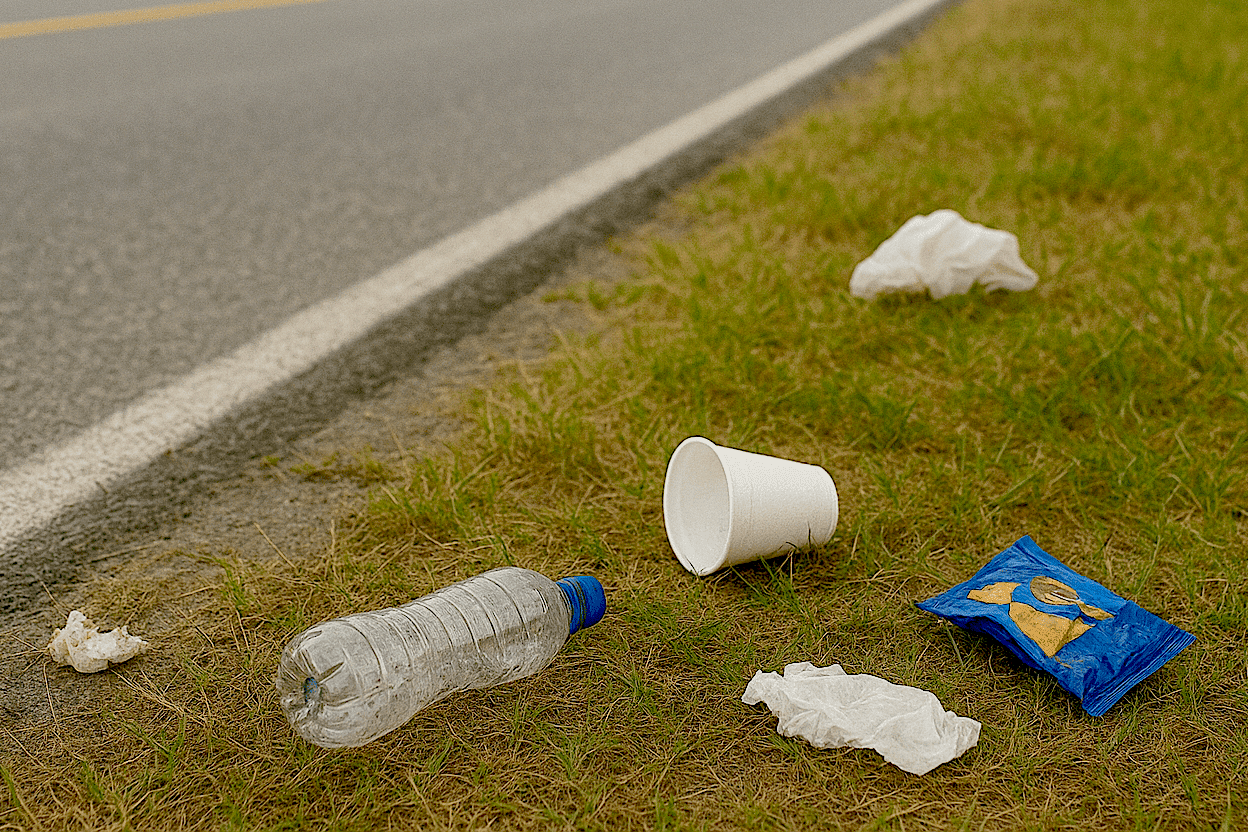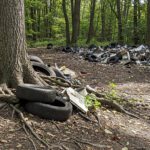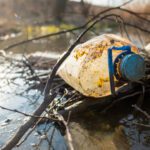
You’ve probably seen it: a fast-food bag tossed out a car window. But what happens next? Litter doesn’t just disappear. It sets off a chain reaction that affects everything from road safety to wildlife. From clogged storm drains that cause neighborhood flooding to the spread of diseases due to contaminated water, a single piece of trash on the road can have far-reaching consequences. A small act of carelessness can ultimately impact road safety, public health, and the natural beauty we all depend on.
Here are six surprising things that happen when trash is left behind:
1. Litter Blocks Drains → Causes Flooding
When wrappers, plastic bags, and drink cups get washed into storm drains, they don’t just vanish. The trash piles up, creating a massive clog. These clogs prevent water from draining properly, especially during heavy rains.
The result? Urban flooding can damage property, disrupt traffic, and often lead to expensive repairs. In some cases, those costs get passed along to taxpayers.
What seems like a harmless bit of litter can overflow into your neighborhood and wallet.
2. Litter Attracts Animals → Endangers Drivers
To wildlife, trash on the road is an open invitation. Food wrappers and containers become irresistible bait for raccoons, opossums, and even deer. But roadsides are dangerous dining spots.
When animals gather near traffic, they’re at greater risk of being hit, as are drivers who swerve to avoid them. These collisions can be deadly for people and animals, all because someone threw their trash out of a window.
3. Litter Jams Equipment → Maintenance Delays
You may not think about how roads get mowed, cleaned, or maintained, but it’s a constant effort, and litter makes it more challenging.
Trash on the road can jam mowing equipment, puncture tires, and create hazards for work crews. When this happens, scheduled maintenance gets delayed, which costs the state time and money, and delays essential work that keeps our roadways safe and usable.
4. Litter Creates Hazards → Makes Roads More Dangerous
Some litter isn’t just inconvenient, it’s outright dangerous. Broken glass, shredded tires, and other debris can cause sudden blowouts or force drivers to swerve. In dry seasons, a single smoldering cigarette butt can ignite grass, sparking a roadside fire.
This increases the risk of accidents, injuries, and emergency response situations, which also puts additional strain on emergency services, potentially overwhelming them if incidents occur rapidly or in large numbers.
5. Litter Spreads → Contaminates Our Waterways
Even if trash starts on land, it doesn’t always stay there. Rainwater can carry litter into storm drains, which flow into creeks, rivers, and eventually into Tennessee’s lakes and waterways, including your popular fishing and swimming spots.
This pollution impacts everyone in many ways. Wildlife that relies on clean water, such as fish and aquatic plants, is directly harmed, leading to a decline in biodiversity. People who fish, swim, or boat in these waters are also at risk of health issues from exposure to pollutants. Additionally, pollution can lead to the closure of recreational areas and harm local economies that rely on tourism and fishing.
6. Litter Sends a Message → Encourages More Litter
Why Believe it or not, one piece of trash makes it more likely that others will follow. Studies show that people follow cues from their environment, so when they see a clean road, they’re more likely to keep it that way. But once litter appears, it signals that it’s “okay” to toss more.
This snowball effect means a single discarded cup can quickly lead to a larger problem. A single piece of trash can turn a minor issue into a major environmental problem.
Help Break the Cycle
While roadside litter may seem minor, it’s anything but. From clogged drains to endangered wildlife, delays in roadwork, increased driving risks, and pollution of our most precious natural resources, litter is a serious issue.
The good news? As an individual, you can help break the cycle. Join a cleanup, report littering when you see it, and set a good example by not littering. Your actions matter. Together, we can protect Tennessee’s roads, waterways, and wildlife – one piece of litter at a time.
Sources:
https://cordeledispatch.com/2023/10/26/the-hidden-dangers-of-litter/
https://www.earthandanimals.com/advocate/wild-earth/params/post/1285482/litter-hurts-critters
https://www.doi.gov/ocl/marine-debris-impacts
https://www.waste360.com/industry-insights/the-psychology-of-littering



